#Farm Animal Health
Explore tagged Tumblr posts
Text
Emerging Trends in Veterinary Antibiotics: Europe Market Analysis
The Europe veterinary antibiotics market size is expected to reach USD 1.31 billion by 2030. The rising focus on animal-only antibiotics and ionophores, the launch of new products, and the increasing use of veterinary antibiotics are some of the major factors augmenting the industry's growth. In addition, the rising prevalence and incidence of livestock diseases and concerns regarding zoonoses are further propelling the industry's growth. The COVID-19 pandemic has affected the veterinary antibiotic business operations of key players and resulted in declined financial performance during the initial time.
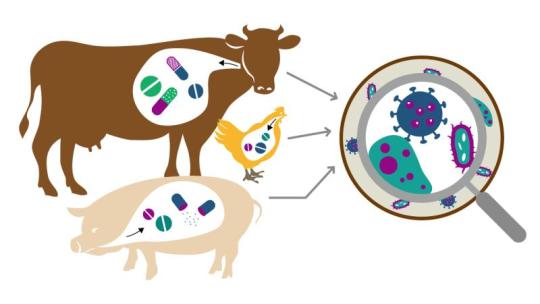
Gain deeper insights on the market and receive your free copy with TOC now @: Europe Veterinary Antibiotics Market Report
The effect of the pandemic with various production and supply chain bottlenecks delayed the delivery of necessary raw materials or active ingredients and postponed certain research & development activities. However, with the easing of restrictions, manufacturers were able to supply antibiotics to meet the necessary veterinary requirements. Few major players have reported significant growth in antibiotic sales despite the pandemic. For instance, Virbac’s bovine antibiotic sales grew from USD 66.98 million in 2020 to USD 79.30 million in 2021. The global concern regarding antibiotic resistance is growing in agriculture and veterinary medicine. Despite the regulatory changes implemented by the European Medicines Agency (EMA) for restriction and ban on routine antibiotic use, the overall sales of veterinary antimicrobial active ingredients have observed significant growth in the past few years.
For instance, according to the EMA, overall veterinary antimicrobial active substance sales grew from 5,282 tonnes in 2019 to 5,562 tonnes in 2020. Furthermore, major players, such as Elanco, have shifted their focus to animal-only antibiotics, as a measure to address antibiotic resistance while also protecting animal health. Key players are implementing various strategic initiatives, such as mergers, partnerships, acquisitions, collaborations, and new product launches, to maintain their competitive edge. For instance, in December 2021, Virbac, in collaboration with Pharmgate, launched Tulissin, an antibiotic solution for swine and cattle with respiratory pathologies. These activities are expected to intensify the competition between major antibiotic manufacturers in the coming years.
#VetAntibiotics#AnimalHealth#VetMedicine#AntibioticResistance#Vet Care#Animal Welfare#Healthy Animals#Vet Pharmacy#Antibiotic Stewardship#Pet Health#Livestock Care#Vet Science#One Health#Sustainable Farming#Animal Treatment#Veterinary Solutions#Antibiotic Awareness#Farm Animal Health#Vet Research
0 notes
Text
SJCHSBCUSCBUSCB THE FREEVIC BRAINROT TOOK OVER
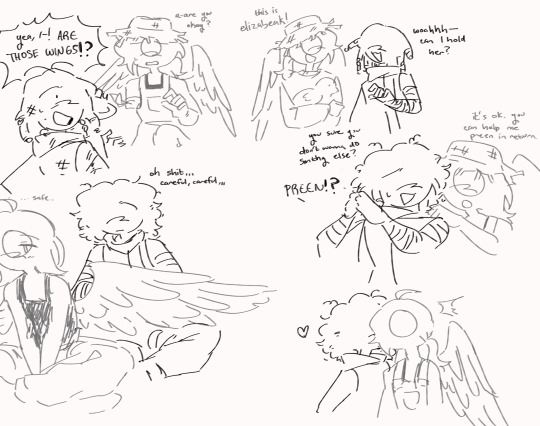
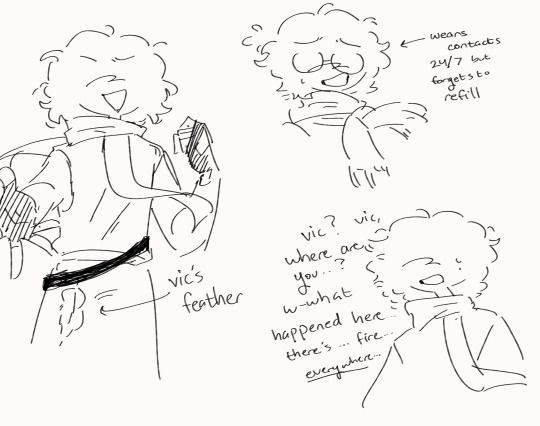
#my art#ava#animator vs animation#ava victim#ava freedom guy#freevic#ava ships#goddamnit#ugh#anyways you know that one headcanon abt chosen and dark destroying vic’s farm?#yeah.#the urge to write a fic about them is so real actually#it’s so Very There#also freedom took refuge in vic’s isolated farm after a rlly bad fight and vic is nursing him back to health#vic vanished after the burning of his farm and freedom has no idea where he is#little does he know vic later becomes the boss of rocket corp LMAO
135 notes
·
View notes
Text


🐱 I love you, fur-real I do! 🐱
#cute cats#cats of tumblr#my photos#Pachi#cats#cottage aesthetic#aesthetic#follow me#for you#explore#mental health#follow for follow#bipolar disorder#instant folllow back#animals#furry#cottagecore#nature core#love#follow back#actually bipolar#photography#animal photography#cute animals#sky#farmcore#farm animals#farm life
27 notes
·
View notes
Text
Dandelion News - August 22-28
Like these weekly compilations? Tip me at $kaybarr1735 or check out my new(ly repurposed) Patreon!
1. Safari park welcomes flamingo chicks

“An animal park has said it is experiencing a "baby boom", including new flamingo chicks that have hatched. Longleat Safari Park in Wiltshire has also recently welcomed rare Amur tiger cubs and an endangered cotton top tamarin monkey baby. [… Flamingos] live 15-20 years in the wild, however in captivity and safe from predators, they can reach ages of 70 years.”
2. Golf clubs fight biodiversity loss

“The project aims to help green-keepers create havens for wildlife, particularly bees and butterflies, as well as introduce mowing methods to protect rare chalk grassland and encourage wildflowers. […] “Clubs doing this are seeing significant increases in pollinators, such as butterflies, without impeding the game."”
3. ‘We’ve got baby owls again’: how farming policy is helping English wildlife

“[In Abby Allen’s] lush Devon fields native cattle graze alongside 400-year-old hedgerows, with birds and butterflies enjoying the species-rich pasture. [… The Environmental Land Management Scheme] pays farmers for things such as planting hedges, sowing wildflowers for birds to feed on and leaving corners of their land wild for nature.”
4. $440 Million to Support Pregnant and New Moms, Infants, and Children through Voluntary Home Visiting Programs
“Through this program […] trained health workers […] provide support on breastfeeding, safe sleep for babies, learning and communications practices that promote early language development, developmental screening, getting children ready to succeed in school, and connecting with key services and resources in the community – like affordable childcare or job and educational opportunities. […] In addition, the [CDC] announced a new investment of $118.5 million, over five years, to 46 states [and] six territories […] to continue building the public health infrastructure to better identify and prevent pregnancy-related deaths.”
5. Endangered leopard frogs released into the wild

“More than a hundred leopard frogs have been released into the wild at Columbia National Wildlife Refuge in Washington state. Leopard frogs are endemic to North America but have been classed as endangered since 1999.”
6. Heat-based batteries are a surprisingly versatile tool

“[T]hermal energy storage [… is] expected to be more cost-effective than conventional lithium-ion batteries for storing cheap clean electricity over longer durations[….] Thermal storage systems take up less space per unit of energy stored than lithium-ion batteries do, [… and] can also deliver their stored energy without the efficiency losses that occur in converting electricity from [AC to DC and back].”
7. Dolly Parton is sending free books to children across 21 states — and around the world

“[In 21 states,] all children under the age of 5 can enroll to have books mailed to their homes monthly. […] Since the program started, books have been sent to more than 240 million to [sic] kids in the U.S., Canada, the United Kingdom, Ireland and Australia.”
8. Biden-Harris Administration Awards $100 Million to Navigators Who Will Help Millions of Americans - Especially in Underserved Communities - Sign Up for Health Coverage
“The grants are part of a commitment of up to $500 million over five years - the longest grant period and financial commitment to date, and a critical boost for recruiting trusted local organizations to better connect with those who often face barriers to obtaining health care coverage. […] Navigators offer free assistance to people exploring health coverage options through HealthCare.gov, from reviewing available plans to assisting with eligibility and enrollment forms, and post-enrollment services such as using their coverage to get care.”
9. ‘Ultra-Accommodating’ Hotel Concept Goes Beyond ADA Accessible

“The property […] will feature wider hallways, larger guest rooms, easy access to elevators and other modifications that exceed the standards required under the [ADA]. Staff will be trained in disability etiquette, how to assist with mobility devices and provide various accommodations ranging from hearing aid loops to sensory-sensitive lighting. […] The location in San Antonio is expected to be the first — not the only one — developed under this concept.”
10. Melbourne zoo welcomes rare southern white rhino calf to the world

“Kipenzi and the new calf have been closely monitored this week, with mother and baby being kept in a secluded area accessible only to keepers while they get to know each other and bond. […] The calf has already been showing a forthright personality, snorting and stomping around his enclosure[….]”
August 15-21 news here | (all credit for images and written material can be found at the source linked; I don’t claim credit for anything but curating.)
#hopepunk#good news#flamingo#zoo#animals#tiger#monkey#golf#golf course#biodiversity#farming#farm#england#uk#pregnancy#education#reproductive health#healthcare#frogs#endangered species#washington state#energy storage#batteries#electricity#dolly parton#books#health insurance#accessibility#white rhino#rhino
29 notes
·
View notes
Text
Hopefully in another life animals are not enslaved for human pleasure.





#life#animals#animal cruelty#hopefully#sheeps#horses#farm animals#human pleasure#humans#lana del rey#girlblogger#girlblogging#honeymoon#lana del ray aka lizzy grant#ultraviolence#lana del ray aesthetic#born to die paradise edition#farm#farmers daughter#vintage americana#farm aesthetic#mental health#trending#self awareness#americana#thought daughter
24 notes
·
View notes
Text
some vegan points i agree with but the leather stand is straight up retarded noooo don't buy vintage leather/fur that's out of use currently and will last you a lifetime and the next generation too, buy cheap plastic instead every year because it breaks down and stops being functional constantly and didn't even work to begin with and contribute to landfills and ultimately mass species extinction and climate change, that will somehow save the animals
#i genuinely think the sustainability/eco movement and the vegan movement clash in a lot of ways atp#well i also don't agree with not eating meat which is the essential part of veganism lawl but you can do it in some ways that are less#harmful for sure both for the environment and the animals#if you make me go plant based i'll feel like a miserable dog forced to eat vegan instead of enjoying a nice bone#>no but we need to sacrifice our health now that we know better and are to blame for farma#farms*#<- genuine vegan argument i have seen#vegan non edible products i prefer though testing on animals is stupid as hell literal torture and it's not even effective in any way
15 notes
·
View notes
Text
Did you know?
That you can be an animal rights activist without being vegan or vegetarian?
That you can believe that the cruelty towards animals in the meat industry is unjust without believing everyone in the world should be vegan/vegetarian?
That you can believe that there are far better, more humane and merciful ways to slaughter livestock than what we currently do without being vegan?
That you can believe that the conditions and environments of animals, farm or pets or wild, should be a priority amongst people without being vegan or vegetarian?
That you can have strong opinions on animal cruelty without being vegan or vegetarian?
That you can be vegan without trying to force everyone else to also be vegan?
(Kudos to thoes who do. Love u)
That you can believe all life, from insects to trees, from land and sea, should be treated with respect- while still also acknowledging that no one is ever going to stop eating meat?
That people are vegans for alot of reasons, and not always, if not rarely, for protest or performative reasons?
#vegan#veganism#vegetarian#animal rights#lgbt#lgbtq#human rights#activist#leftist#socialism#meat eaters#herbivore#animals#animal life#life#respect#meat industry#farm to table#politics#environment#environmental health#environmentalism
17 notes
·
View notes
Text
"I'm not leaving you behind! It is my duty," he hissed. "I swore myself-"
"Your swore yourself because you had no choice, Percy." Her eyes were endless dark, devoid of feeling, of life. "You had a price to pay for your mother's life and this was your only offer." Her thin fingers cup his face through the bars. "You didn't choose to be my protector." She gave a weak laugh that made his stomach plummet to the floor. "You're not even my guard yet, not really."
Like a phantom, her touch slid down his cheek. He caught her wrist before her fingertip stopped gracing his skin. He could feel the rounded edge of her fingernail poke against him. Silence held fraught between them.
"Bianca-"
"Percy," she cut in, voice so sharp it cut him to the core. "I want you to survive. You're free. Take advantage of that, and go. Now."
"I can't go back without you," he said, quickly. She didn't fight his hold, but still his grip tightened. As though the harder he held her, the more she would stop protesting her escape. "You are-"
"Dead." Her lips thinned. "I'm dead, Percy. I was dead the moment they got their hands on me and I will be dead before either one of us even makes it beyond these walls, but you-" Her voice cracked, eyes watering.
He shook his head. Blood pounded in his ears. He didn't want to hear what she was going to say, wanted her to stop, wanted it all to stop. Just for a moment.
But it didn't, and neither did she. With a deep breath, she carried on, "You can make it. You can live. But only if you leave without me, so go."
His lungs burned. She inhaled so deeply, spoke so forcefully, and it made him hold the air in his chest until he couldn't take it anymore. If he didn't breathe, maybe she would. But his chest ached. Self-loathing wedged itself like a rock in his throat as he let go. The sound of his own breath was like nail on chalkboard.
"Percy," she whispered. He shook his head and leaned in closer. Although tears hadn't yet fallen, her eyes were still wet. They glistened like the night sky. Her forehead pressed against the bars.
He looked away. The brick wall to his left was growing a fair bit of moss in the corner. "What's our star again?"
She laughed. It was a watery thing that choked him where he stood. Memories of standing the long grass, moonlight shining off the river, while she read her books beside him. Every so often, she'd look up at the night sky and search for the brightest star that month. She'd tell the stories behind the constellations. Or at least the stories from her kingdom. Any time she told a story, a fantastical myth, she'd follow up that her brother knew more - Nico, the quiet prince with a voracious appetite for legends and monsters.
Then, if she could spot the brightest star that month and if she recalled, she'd tell him what it meant for the people born that month. At least, in their hemisphere anyway. The stars were different elsewhere. Sometimes she'd crack open the newspaper, the stark image of her father, and read aloud the horoscopes.
He still remembered the incredulous sound she made when he told her they shared the same birthday. She'd dragged him to the library to refresh her memory on their star. Then argued furiously that he did not share the same traits as her.
It was a silly thing. She didn't believe it. He didn't either. But it was the first time they hadn't played the stiff act of royal princess and her knight-in-training. Not Percy holding his tongue and following strictly one step behind. Not Bianca doing her best to pretend he wasn't her shadow.
Awkward civility and stiffness carried thick between them from the moment Percy had been casted into his role. But that night, with the sound of yelling and laughter still echoing in their ears, they made an agreement. They didn't have to be the best of friends, but they sure could be casual with each other. After all, they were going to be stuck with each other for the rest of their lives.
At least... they were supposed to be.
Slowly each finger detached one by one until all that was left was his palm pressed against her wrist. Then that fell away too. Still he couldn't bare to turn his head and face her.
"Leo," she said. "The lion. Strength, pride, loyalty, confidence."
A stabbed orange toy on new year's day passed through his mind. "Sacrifice."
It was quiet for a beat. Then, "Yes." His heart hammered so fast he could feel it in his throat. "The lion represents sacrifice."
What was he supposed to say? He wanted to run, to turn the lock with the key he stole, take her and run. Run far and fast. But deep inside, he knew she was right. He could get by undetected. No one cared about a child knight, not even yet passed his training. He could blend in and slip out. Even if he got caught, they wouldn't nearly put in as much effort to get him back as they would if she were with him.
She was right.
She was already dead.
He swallowed thickly and met her eyes again. The night sky glistened back at him and he thought of constellations and warm handshakes and kind agreements and silly arguments. Breath caught in his throat. "I'll miss you," he whispered, voice hoarse.
Her lips twitched. "I'll miss you too." She blinked, and one tear slid down her cheek. He tracked the wet trace it left behind until it welled up at the bottom of her chin and dripped to the floor. "Will you do me a favour?"
"You're my princess," he said. "I would do anything for you."
It was a weak smile she gave before she spoke. The sight of it crushed him. "Tell my family I love them." Her breath escaped from her shakily. She pushed back her hair. A classic move to hide the nerves that drove her hands to tremble ever so slightly. "And take care of Nico. Please."
"I will," he promised.
Her smile strengthened ever so slightly. But the tears fell fast now, one right after the other. Her face tilted away at the first streak. He immediately turned his line of sight back to the brick wall. Weakness, sadness, grief - she hated being seen with any of them. He always respected it. Look away until she was done. Don't speak, don't ask her anything, don't help her. Just look away and stay silent unless she calls out.
So, even as his mind's eye was trapped in the wet track of tears on her skin, the hitched sound of her breath holding in a cry, he turned and headed back for the dungeon's door. The doorknob twisted in his hand. The door cracked open.
"Percy."
He held stiff. "Yes?"
"Don't forget the bracelet."
Heat burned at the back of his head. In his pocket, the bracelet felt heavier than the weight of the world. When he had first arrived, she gave it to him. When he refused to take it, insistent that she could deliver it to Nico herself, she shoved it into his pocket herself. Like a ghostly stain, his thigh still tingled with the forceful and firm press of her hand. He was sure it always would.
"I won't."
"Stay safe," she said, a princess in a dungeon ready and waiting to die.
His heart shattered. Still, he kept his head held high. "I will."
Then, without another word, he left the girl he had spent the last three years training to protect. He was meant to die for her. It was the role he had accepted the night he and his friends had stormed the castle and pleaded for help with his dying mother. He didn't argue. He didn't plead. Without hesitation, he swore his life away for hers. Without hesitation, he swore his last breath would be hers.
Yet she was the one embracing the eternal coldness to come. She was the one breathing weakly so he could breathe strong. She was trading away her life for his. She was the lion, giving a mighty roar before the dawn of a new year. She was the sacrifice, held down by chains with a glistening sharp blade raised above her head.
But he wasn't the one lowering it upon her neck. No, he was the cold breath of winter. The first drop of snow. The wilting grass. He was the barren wasteland that drove her out into the open. He was the starving masses desperate to live. He didn't have to drop the blade. He didn't have to use his own hands to spill her blood across the ground. His survival was her end. And that made him her killer anyway.
#bianca di angelo#percy jackson#had this thought that was basically what if percy was bianca's bodyguard and became obsessed with protecting nico after she died#and this this happened#happy talks pjo#my writing#my fanfic#the lion leo constellation thing was spur of the moment so the whole sacrifice concept after was made up as i was going along#but anyway the thing i made up for it in this AU or whatever is that in hades' kingdom the start of the year begins with winter#so in the before times winter would come and the people would struggle but they'd be okay but one day the winter was awful#the food stores were ruined and the winter farms were weakened so people began to go hungry as they rationed the food#but the winter was so bad it also drove out the animals in the forest including a pack of lions which the people killed for meat to survive#so every new year as a tradition a lion is sacrificed as like a promise of survival and prosperity and health and whatever#a real lion is sacrificed publicly by the royal family. other people will sacrifice a placeholder like a lion toy or a painting of a lion#idk what they do with the lion after - maybe the royal family eats it or households do a lottery to get a portion of its meat delivered#could i not have just made up a separate new thing for percy's birthday month? yeah. but that would've required more effort and i'm so tire#fuuuck is it really 10pm? shit i need to eat
47 notes
·
View notes
Text
understand the sentiment of ppl saying fuck farmers but i feel we gotta be more specific in our hate bc MOST people who work in the agri sector are having a really bad fucking time and do wish things were better
#lots of human and animal exploitation and mental health crises in farming at the hands of several powerful forces#for every bougie farmer who earns boatloads of cash are dozens of labourers who think of ending it all
50 notes
·
View notes
Text

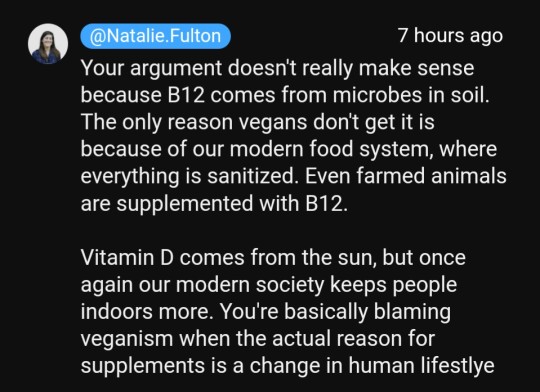
Natalie Fulton responding about the integration of B12 and Vitamin D supplements in a plant-exclusive diet
#even farmed animals are supplemented with B12#vegan#health#natalie fulton#I'm using the term plant-exclusive because of chef aj YouTube channel!
2 notes
·
View notes
Text
"rescued from a fur farm" you mean you BOUGHT an animal and CONTRIBUTED to the fur industry for your own pick-me cinderella hypocritical self rightousness
small animal fur farms are bougie bullshit but just admit you want a ~special pet~ rather than spin it as something non selfish
*not all fur is bad. large animal fur is incredibly useful and when well kept can last decades longer than plastic polyester bullshit
*I will not be debating anyone on this topic
#daily stuff#hot take dont @ me#most fur farm animals are also incredibly inbred#so they have a bunch of health problems too#and most of these buyers dont bother doing research#like a lot of exotics impulse buyers#and so dont know how to care for them properly#this is brought to you by the repeated posts i see on my dash of the fucking fox blog
17 notes
·
View notes
Text
The Farm as a Place of Healing - Vinland Saga
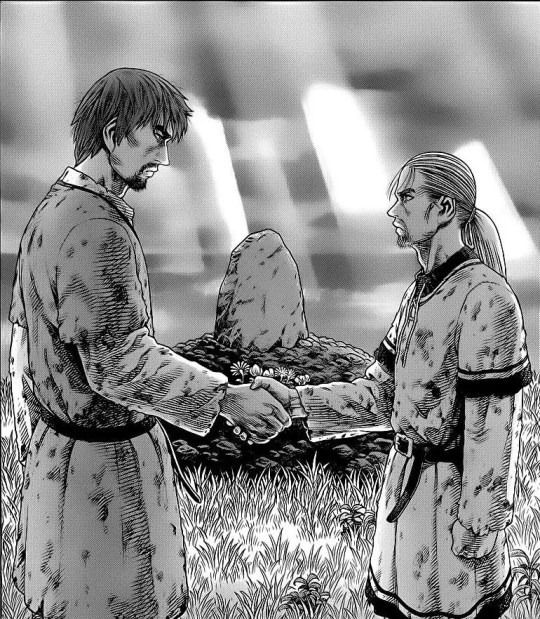
A while back when I was researching the clubhouse model for mental health, I found out that the clubhouse I visited in New York City had their very own farm. Its members, who have various serious mental illnesses, would travel there to grow crops, raise livestock, and more importantly, be around other people with the common goal of improving the farm and themselves.
Today, I was reminded of this particular farm thanks to the Farm Arc (Volumes 9-14) of Makoto Yukimura's Vinland Saga. It's an incredible testament to how much nature can promote better mental health.
For those unfamiliar with the story of Vinland Saga, it chronicles the age of the Vikings. A young man named Thorfinn travels with a Viking named Askeladd in order to get a chance to kill him one day. This is due to Askeladd killing Thorfinn's father, Thors, right in front of his eyes. Throughout Thorfinn's journey in Volumes 1-8, he encounters a variety of personalities while killing those who get in the way of his vengeance. However, one incident would change Thorfinn's plans forever. Askeladd is killed after he kills King Sweyn, a Danish king who wanted to control all of England and Wales, in front of Sweyn's guards. Now struggling to figure out what to do with his life, Thorfinn would later become a slave at a farm in Denmark, empty and full of grief.
A year after is when Thorfinn's story truly begins.
So how do farms help in dealing with all kinds of mental health issues? For starters, they get you away from modern cities. Cities are known to be super-stressful with how fast-paced and competitive you need to be to survive. It also doesn't help that they're often big, so one can get lost in the crowd when dealing with emotional pain.
Farms also are great places to have meaningful relationships due to everyone working together for a meaningful cause. For Thorfinn, he finally made his first friend in his fellow slave, Einar. Einar was full of life and questioned many things. He would find the farm to be somewhat of a haven despite being a slave. Although Thorfinn was struggling with the trauma from his past, Einar opened up his eyes to see that a different path could be chosen instead of feeling empty. This becomes evident when Einar convinces Thorfinn to help gradually grow some crops in their limited free time to buy their way to freedom from slavery.
Another notable thing about farms is that they allow you to sit in nature and give you the ability to self-reflect. Since being a slave at the farm, Thorfinn is consumed by nightmares of his father, Askeladd, and those he killed. He had a tough time trying to come to terms with his actions. But Thorfinn slowly opens up to Einar about his past as a Viking and the self-reflection begins to kick in. It isn't until he and Einar fought against farm vandals that he becomes spiritually awakened.
In what's to be his last nightmare, a land filled with a pile of corpses, Thorfinn reveals to a dead Askeladd that he's sorry for killing so many people over the years out of vengeance. Askeladd chastises Thorfinn and says that there's only one way to make amends - to become a "true warrior" like Thorfinn's father once told him. When Thorfinn wakes up, he tells Einar that he's through with violence and vows not to hurt anyone ever again.
Many times, people are told not to sit with their pain. But if we keep running away, we will never truly heal. It's hard to talk about grief when modernity demands us to keep moving forward. In nature and with other people (even if they aren't the nicest bunch), Thorfinn finally got a chance to process his grief and what it means to live. This is mostly due to being surrounded by people who are full of pain themselves from the farm owner, Ketil, to everyone else associated with it.
And speaking of people who are full of pain, I will get to the son of King Sweyn, Canute. When first introduced in Vinland Saga, he was a timid young man who was teased for looking too feminine to be a potential heir to the throne. Canute was placed under Askeladd's protection and felt empty himself. However, Canute slowly became what the young Thorfinn was - a man on a path of violence to get what he wants. After Sweyn's death, he took the throne and went on a raid of conquering everything around him. His father often appears to him in a ghostly form cursing him. Canute also was responsible for sending Thorfinn to the farm. In a twist of fate, Canute decides to target the same farm 4 years later for resources and out of personal animosity towards Ketil as he didn't respect him as king. The farm would become a place for Canute to heal from his own personal trauma.
A violent battle occurs within the farm, but Thorfinn decides to take a final stand against Canute's army by directly speaking with Canute himself. He suggests that he takes 100 punches by one of Canute's warriors. If Thorfinn is still standing afterwards, he gets to talk to Canute and convince him not to take the farm. Thorfinn gets his wish much to the awe of everyone who witnesses the event. Both he and Canute would get into a lengthy conversation about what constitutes a perfect paradise for humanity. When Canute re-affirms his goals to rob and kill everything in his sight for peace no matter what, Thorfinn replies that he will just run to a place he'll create that Canute won't reach. Canute is shocked that Thorfinn wouldn't attack him face-to-face, but respects how bold his former companion's newfound pacifism is.
And Thorfinn says something that changes Canute's perspective for good.
"You have to give me some help. My power is far smaller than yours. The hole you make might be too big for me. If you continue to persecute others like this...sooner or later, no one will be able to save you. So do some work. Don't make my job harder."
Canute is convinced and decides not to take the farm. After being surrounded by so much political scheming over the years, he realized that there are others who still care about him and want what he truly wants. Canute ends his attempts to grab power via violent means and would gradually become a king who truly respects and loves his people. The farm also no longer became a place for slaves and those who were still alive and cared about it made sure it will continue to grow.
And all of this happened at a farm setting. It felt like reading farm-based therapy in a historical context. The farm gave Thorfinn purpose, confidence and the ability to help others just like how farms today have done for those struggling with all kinds of mental health issues (minus the slavery part). More importantly, the farm fosters cooperation among the community as the way to feel alive instead of competition.
I've heard stories about people being stressed out from modern life and how they found solace in nature after realizing the sense of emptiness they start feeling. In a farm, you're free from various constraints that modernity places. Sure, there may be new constraints. But in exchange, you feel that you have some control in deciding what you want for yourself, see what's truly important, and learn another important fact of life - you have to go with the ebbs and flow of nature despite whatever governing body says.
Although I haven't been to a farm in very long time, I try to expose myself more to green spaces and pay attention to nature around me. I look at plants, birds, and other animals that hang around the area. I believe they have helped a lot in reminding me to slow down at times. Combined with the variety of people I've met in my life so far, I feel that I can still do something with my life despite the difficulties I'll face like Thorfinn has.
I hope everyone finds and/or have their own personal farm to go to because humanity's nature definitely needs a upgrade to actual nature.
14 notes
·
View notes
Text
Optimizing Livestock Health: Feed Activities and Biosecurity Best Practices by Optima Life Sciences
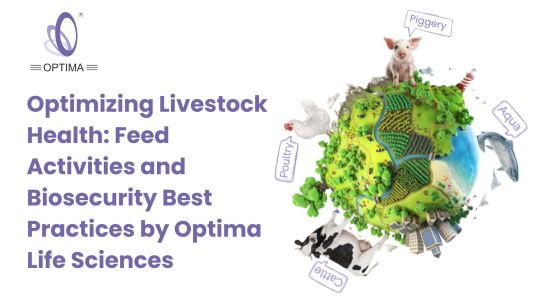
Ensuring maximum health and productivity is crucial in this dynamic world of livestock husbandry. Optima Life Sciences is very well aware of the vital role of biosecurity and feed operations that prevent disease and promote livestock well-being.
We’ll discuss the best practices recommended by Optima Life Sciences in this blog article for maintaining the health of livestock by using efficient feed management and biosecurity procedures.
Some best practices for feed management are:
The proper sources must be chosen when it comes to feed management, according to best practices. Choosing a reliable supplier who maintains a high priority on quality assurance and follows stringent safety guidelines when it comes to feed ingredients. At Optima life Sciences, we stress on how crucial it is to use cutting edge processing methods to get rid of infections without sacrificing vital nutrients in the feed. Every aspect of feed management, from handling cleanliness to storage options, is carefully tuned to reduce the chance of disease transmission.
Some best practices for Biosecurity are:
Biosecurity can play a significant role in the success of a swine operation. The purpose of a biosecurity program is to protect animals from foreign pathogens they have not been exposed to. A biosecurity program helps minimize the impact of illness that are hard to identify. Make sure you are operating with biosecurity in mind when removing culls or mortalities from the herd. A technique such as stage loading could be a possibility for culls. Be cognizant of the contamination risks associated with rendering trucks. Inspect your animals regularly to ensure they are healthy and safe from disease. Vet any new animals before purchasing them to ensure they aren’t bringing disease to your property. Consider identifying an area as a quarantine zone for animals coming onto the farm which can be kept isolated from the other animals.
With the combination of complete biosecurity policies with best practices of feed management, Optima Life Sciences can ensure a comprehensive approach to disease prevention in livestock production. While reducing the effects of disease issues, our customized solutions put animal health, welfare and productivity first. Providing our clients with surveillance networks because we recognize that early diagnosis and reaction to disease outbreak depend on proactive monitoring.
#feed additives for optimal animal nutrition#Optima Life Sciences#liquid dosing systems for precise animal medication#high quality disinfectants for animal facilities#animal health supplements#animal health#Cost-Effective Feed Additives for Performance Solutions#Poultry health support technology in pune#animal health supplements for poultry#poultry feed#Poultry health performance enhancing products in pune#feed milling solutions in pune#high performance solutions in pune#Premium Animal Health & Nutrition Product suppliers in pune#cost effective performance solutions product in maharashtra#Animal health supplements for poultry#Feed additives for optimal animal nutrition#Farm biosecurity solutions#High-quality disinfectants for animal facilities#Comprehensive farm disinfection services#Liquid dosing systems for precise animal medication#Advanced feed supplements for farm animals#biosecurity solutions
2 notes
·
View notes
Text
Animal Feed Additive Market- Nourishing Industry Landscape
Animal feed additives are used to meet the nutritional needs of animals through the feed itself. This combination of ingredients is added to the animal feed mix to fulfill specific growth demands. These additives are usually added in micro quantity. It is used to increase efficiency, control diseases, and rate of gain.
Animal feed additives are vital in modern agriculture to enhance the nutritional capacity of livestock. From vitamins and minerals, probiotics, and additives continue to contribute to growth and overall performance. Animal feed additives are increasingly being demanded for optimizing feed quality and promoting animal welfare.
Antioxidants and amino acids supplements are growth promoters as the livestock industry is challenged by growing demand for the population. Ensuring the supply of quality food and animal well-being from a sustainability perspective are upfront challenges ahead of companies.
Innovation and research are keys to improving food production sustainability and their impact on animal farming. It reduced the carbon footprint of agriculture. Farmers have become increasingly aware of their feed impact and the overall performance of their livestock. Stringent quality standards of livestock feed are pushing farmers towards high-quality feed additives in animal nutrition programs.
Several countries have placed restrictions on the use of antibiotics in animal feed as it created conditions of antimicrobial resistance. The paradigm shift in the industry towards sustainable alternatives is anticipated to increase the share of animal feed additives in the coming years.
4 notes
·
View notes
Text
“Animal Farm” the book by George Orwell prepared me for the current future in a way I was not expecting. In that some people, no matter their experience or knowledge, will think they know what’s best for others. And then try to force that onto them.
#now exfriend really wanted to call the cops on me for being mentally ill#sure i was manic at the time but the only danger was to myself#and if he cared at all he would have noticed#some people suck but you dont find out for a while#anyway fuck him#he needs to be hit by some karma#actually mentally ill#mental health#mental illness#animal farm#george orwell#dystopia#Terry talks
3 notes
·
View notes
Text
Why Is Arnold Schwarzenegger Vegan?
Introduction Why is Arnold Schwarzenegger vegan? This question piques the curiosity of many, given Arnold’s iconic status as a world-renowned bodybuilder, actor, and former governor. Known for his extraordinary physique and strength, Arnold’s switch to a vegan lifestyle seems contrary to the stereotypical image of a meat-consuming bodybuilder. This article delves into Arnold Schwarzenegger’s…

View On WordPress
#animal welfare#Arnold Schwarzenegger#celebrity vegan advocates#environmental advocacy#environmental impact of diet#ethical eating#fitness industry#health benefits of veganism#plant-based diet#plant-based protein#strength and veganism#sustainable farming#sustainable living#vegan lifestyle#veganism and muscle building#Why Is Arnold Schwarzenegger Vegan
3 notes
·
View notes